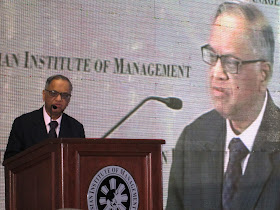N. R. Narayana Murthy, Indian businessman and co-founder of Infosys
(third largest IT company in the world) delivered a talk at AIM last February
21. He impressed upon his audience some valuable lessons on being a successful
entrepreneur and leader of industry. So what makes a great leader? Here is my
personal integration on how N.R. Narayana Murthy counts the ways.
Character. Good leaders have
a clear grasp of what they wish to achieve (their vision), who they are, and
what they can offer. Murthy sums this up in a concept: a clear and concise
differentiated value proposition, i.e, what an individual or organization can
offer that sets it apart from the rest. Add to it a firm commitment to hard
work and integrity, and a capacity to sacrifice personal interest for the good
of the organization or society. When people see these traits in leaders, they
tend to be more attracted to the vision they share, for they lead by example.
A properly-formed character is also the best safeguard against the debilitating
effects of mindsets, which come from the data
base of our experiences that coagulate into supposedly proven ways of doing
things that lull us to complacency and encourage mediocrity. A good leader
committed to change is able to recognize innovative ideas and liberate them from
mindsets.
Courage. Murthy actually
identifies courage as the most important attribute of a good leader. This means
the courage to dream big, take moral decisions, implement strategy, go against
conventional wisdom, and travel roads less travelled, or in some cases
untraveled. If entrepreneurship is about transforming ideas into wealth, of making the
implausibly impossible possible, then courage is indeed the defining trait of
the entrepreneur. It is also about knowing that subscribing to a value system
entails cost. Taking a risk because one’s value system demands it is the true
test of courage.
Creativity. Murthy calls it
the drive for innovation. A good leader should know how to dream, and be able
to convince others that his dream is worth taking – but he should also be open
to new ideas. The best way to generate new ideas is to work in improving
competence, gaining crucial experience and knowledge in the process.
For the
entrepreneur, creativity may mean the constant search for that which will make
his products or services better, faster, cheaper. This is also a good rule for
development work. The conviction that there ought to be a better way of
delivering services, recognizing rights, or empowering people is the starting
point in the journey of transforming inequality to equity.
Care for Persons. Murthy
jokingly talks about his transformation from a confused socialist to a
compassionate capitalist (as some have described him), but he does walk his
talk when it comes to his concern for people. He calls it generosity. At the
outset, it makes good business sense to care of people – clients, partners, and
employees alike. It ensures repeat business, investor confidence and employee
loyalty. More than these however, values such as fairness and transparency,
courtesy and humility, and generosity of heart (“praise in public, prescribe in
private, take blame for failures”) builds people’s trust in the leader and self-esteem
and confidence in themselves.
At the crucial nexus between having the vision to
effect change and other people’s willingness to follow or, better yet, take
such vision as their own, lies the trust that they have on the one carrying the
message. The truism “the medium is the message” may already be a cliché but
still rings ever true today: people will accept and carry the message for as long
its messenger proves himself genuinely trustworthy and his message empowering.

No comments:
Post a Comment